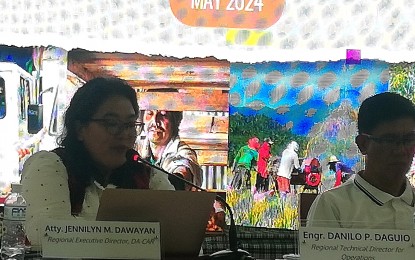
PLANS IN PLACE. Department of Agriculture-Cordillera regional director Atty. Jennilyn Dawayan (left) said an initial PHP488 million has been allocated for the La Niña action plan as the region is currently experiencing the transition period from El Niño to the upcoming wet season. The action plan and utilization of the budget will focus not just on the response during the onslaught of La Niña but on preparations that are necessary to prevent massive negative effect on the region’s agriculture industry. (PNA photo by Liza T. Agoot)
BAGUIO CITY – The Department of Agriculture-Cordillera Administrative Region (DA-CAR) has allotted PHP488.5 million as response and preparation funds for La Niña-related events.
“We have started our preparation through the conduct of information campaigns about La Niña adaptation specifically on climate resilient commodities, the importance of buffer stocking and other safety and protection measures to prevent a big impact to the farmers and fisherfolks,” lawyer Jennilyn Dawayan, DA-CAR director, said in a press conference as part of the Farmers and Fisherfolks Month celebration at their office on Monday.
Citing the regional office’s La Niña’s action plan, Dawayan said an initial budget of PHP432.2 million will be allocated for production support, and PHP32.7 million for the maximization of production areas through the provision of seeds, planting materials and other agricultural and fisheries inputs, which in turn, are focused on pre-positioning of hybrid rice seeds, hybrid yellow corn seeds, and glutinous corn seeds, high-value crops, others seeds and farm inputs, and capacity building training on disaster risk reduction management (DRRM) information system on reporting of damage and losses.
A portion of the budget will also be used for water management activities, advisories on crop insurance, promotion of integrated pest management practices and diversified or integrated farming systems, mobilization of local DRRM task forces in the event of disasters and emerging threats; monitoring and surveillance of pest and diseases, surveillance, detection and prevention of animal diseases, mobilization and access of quick response funds and national DRRM funds for response and early recovery as well as rehabilitation and recovery program.
Also part of the plan is the continuing delivery of production support services, market development services, and other extension support services, cash-for-work in collaboration with the Department of Labor and Employment (DOLE) and the National Irrigation Authority (NIA) for the cleaning of irrigation canals, mobilization of the Kadiwa Trucks and regular monitoring of prices of highland commodities.
“We have started and continue to do information campaigns through the Regional Agriculture and Fisheries Information Service (RAFIS) as a preventive measure,” the director said.
Engineer Danilo Daguio, DA-CAR Regional Technical Director for Operations, in the same press conference, said the fund will help cushion the impact of La Niña on the agriculture sector.
“The PAGASA (Philippine Atmospheric, Geophysical and Astronomical Services Administration) said that there is a 60 percent chance that the region will have strong to heavy rains that will impact the plants that is why we have prepared (for this). La Niña is not new to us, this is something we experience almost every year with several days of continuous rains being a usual occurrence in the region,” he said.
Daguio further mentioned that the region is currently transitioning from El Niño, which is characterized by dry spell, to La Niña, which, on the other hand, is about more rains.
He said there are climate-resilient agricultural commodities that farmers can look into for planting instead of the highly perishable plants that are easily damaged when overly soaked or submerged in rainwater.
The region’s topography as a mountain area is another advantage for the Cordillera given the minimal chance of flooding in many plantation areas, he said.
The timing of planting and harvest is also important information that farmers must be guided on to avoid damage to crops, he added.
During the same event, Oliver Duque, president of the rice farmers federation in Flora Apayao, said in Ilocano: “When we were advised about the El Niño, we adjusted the planting season.”
Marivic Raganit, president of the corn farmers association in Paracelis, Mountain Province added that they were unaffected by the El Niño because they adhered to the experts’ advice about the weather phenomenon.
Both said they intend to do the same and adhere to the advice of the experts to prevent being hit by the major impact of the La Niña. (PNA)
 The Philippine News Agency is a web-based newswire service of the Philippine government under the supervision of the News and Information Bureau (NIB) of the Presidential Communications Office (PCO).
The Philippine News Agency is a web-based newswire service of the Philippine government under the supervision of the News and Information Bureau (NIB) of the Presidential Communications Office (PCO).